MACGREGOR'S COMMERCIAL STATISTICS.
Tus third volumeof this immense collection of commercial and statistical facts and information is devoted to the independent countries of America, —the United States, Mexico, and the South American Republics ; though British America is slightly noticed in the geographical survey of the double continents physical features, and Honduras is treated under the head of Yucatan. Of these various countries, the United States is ex- hibited at much the greatest length; the agricultural and manufacturing productions, the topographical and physical characters, the finances, debt, commerce, and navigation, with many other topics, being exhibited in de- tail for each State, in addition to those more general subjects which relate to the Federal Government in its internal rule or its connexion with foreign 'countries. To this fuller exhibition the United States was entitled from its " Anglo-Saxon" character of kinship, as well as from its commercial and political importance. Something may also be ascribed to the avail- able plenty of materials which the Americans so properly collect, as the briefer exhibition of the Spanish-American Republics may be attributed to the absence of regular and trustworthy statistics. Nature, however, "makes these odds all even." As life is estimated in proportion to its value, and wages depend upon the worth of the work, so in general when there are particulars to reward the statist lie will find the statistics,— unless perhaps in this country, where " what is everybody's business is nobody's."
In so large a collection of facts it is probable that there are mistakes ; and it is certain there must be errors, from the changes that take place in the facts between the time of collection and of publication, if from no other cause : like all the collections we ever saw, the inquirer, who wishes to pursue a subject through its ramifications au fond, may oc- casionally find the facts incomplete. It is possible, too, that Mr. Mac- gregor may ascribe a greater weight to his authorities than all of them are entitled to : and with such an infinite variety of topics, sometimes special, sometimes narrow, there must be many things useless to indivi- dual inquirers. But these and all other objections sink into nothing com- pared with the extent and magnitude of the plan, and the unwearied in- dustry and elaboration of its execution. Not many years since, such a wide range of information, touching the industry, commerce, commercial treaties and laws, fiscal charges connected with trade and navigation, and the monies, weights, and measures of the world, could scarcely have been within the means of states; and now they are available for any counting- house or commercial library at the expense of a few pounds.
The work before us, however, has uses of another and a larger kind, for the student of society or the politician. It often indicates points of difference between one country and another, or suggests speculations, if not deductions that may be of use to the statesman. To go fully into the various topics this volume of nearly fourteen hundred pages might suggest, would require a volume itself; but we will indicate a point or two. Take some facts connected with slavery population in the now free States. Before the first census of 1790, the Facts were of course uncertain ; but in that year the exact number of slaves in each State was ascertained, as they no doubt were in each following decennium. Mr. Macgregor, however, has omitted to state them ; and either he or the original returns fall into comparative deficiencies. Thus, we find no statement for Massachusetts in 1790, though she must have had some slaves, and none for Pennsylvania in 1830. The following table, which we have drawn up, will give the facts of gradual decrease so far as we have the means of showing. The volume enables an inquirer to see the number of free coloured persons now existing in those States; but as the free persons existing in 1790 are not given, any conclusion on the sub- ject must be imperfect. It is one of the cases where the inquirer who travels beyond one set of facts finds the materials incomplete.
The subject of American insurance is fully prosecuted ; and, while wholly borrowed from the English practice, it is curious for the difference its devi- ations suggest in the state of society. Annuities are granted of two classes : one of the usual kind, where the capital is sunk for an annual payment. Another is called an annuity in trust: " a moderate rate of interest is allowed upon the capital, and at the expiration .of the life the whole of that capital is paid back,"—a system only available, it would appear, where profits are high. From some cause or other, a good deal seems to be done in America by companies which is here managed by indi- viduals. Trusteeship appears to be extensively discharged by them, (from the wandering disposition or dubious honesty of individuals ?) and this "trust annuity" is really a mode of employing a small surplus capital with the advantages of a large one ; though, of course, the state of so- ciety must offer facilities for so doing which an old community like ours does not possess. In New York, a wife is allowed to insure her hus- band's life, to a limited premium, and to receive the amount " free from the claims of the representatives of her husband or of any of his creditors." In case of her death before her husband, the amount of the insurance may be made "payable to her children, or to a guardian for their use." A New York company deems it necessary to propitiate Anti-Rent opinion, by undertaking that, " in order to avoid a great land monopoly, all such real estates as shall not be necessary for the accommodation of the com- pany in the convenient transaction of its business shall be sold within six weeks," &c. The American clause of forfeiture is rather more ex- tensive than ours- " Policies of insurance and revisionary contracts am void if the person whose life is insured shall die upon the seas, or upon any of the great lakes, or shall, oitholit the consent of the company, previously obtained and endorsed upon his policy, pass beyond the settled limits of the United States, excepting into the stet- tied limits of the British Provinces of the two Canadas, Nova Scotia, or New Brunswick; or shall, without any such precious consent thus endorsed, visit those parts of the United States which lie. South of the Southern boundaries of the State of Virginia and Kentucky; or shall, without such precious consent thus endorsed, enter into any military or naval service whatsoever, the militia not in actual service excepted; or in case he shall die by his own hands, in or in Consequence of a duel, or by the hands of justice, or in the known violation of
• No return tbr these Statmiln these years. Staves. Year 1790. Year 1830. Year 1840.
In New Hampshire
158
8 1
— Vermont 16
— Rhode Island
948
17 5
— Connecticut 2,764 * 17 — New York 21,324 4
— New Jersey......_ .
11,423 2,254 674
— Delaware
8,887 3,292 2,505 — Pennsylvania — Massachusetts 3,737
• * 64
1 — Maine
2 0 any law of these States, or of the United States, or of the said [British] Pro- vinces."
Mr Macgregor characterizes this last provision as " rather vague" ; but the principle seems clear enough. The executors of a person acci- dentally present at a riot and killed could recover, but not if he were actually engaged in the fray. The policy of a person killed in resisting an arrest, or any other lawful authority, would be void ; also if he met his death by taking part in any Lynch-law proceedinga, unless he were the person banged under them. The clause is a tribute to the "liberty" tendency of the American mind.
The " old dominion," the State of gentlemen, enjoys the rather un• usual privilege of a very gentlemanly load of taxes, on very gentlemanly articles- " In Virginia the revenue is derived from a poll-tax on slaves, assessed taxes on horses, private carriages, four and two-wheeled stage-coaches, private siedges or carryalls, clocks and watches, pianos and plate, licences to merchants, loan- ranoe-offices, lawyers, doctors, keepers of houses of private entertainment, to ex- hibitors of shows, vendors of lottery-tickets, and to owners of stud-horses. A most inquisitorial system of taxation, no doubt ; but to which Virginia has ho- nourably submitted, in order to maintain untarnished the invariably high cha- racter and the credit of the State."
Under the head of Currency and Banking there are some extracts from a capital speech by Webster, warning against any attempt to increase paper issues with a view of replacing the gold which natural circum- stances is draining away. Were it not too long for our columns, we should gladly have quoted part of it : for here, as in America, " there are those who always desire an enlargement of the paper circulation to supply the deficiency of gold, through its exportation] and to keep up prices " ; though "enlargement of paper issues, under such cireunistan- ces, is the first step towards a crisis, commercial distress and revulsion." The same topic supplies some rather striking pictures of official jobbery and corruption : but we must omit them, for the same reason as Web- ster's speech—our want of apace.



























 Previous page
Previous page